DOUBT from The Climate Reality Project on Vimeo.
http://climaterealityproject.org/
DOUBT from The Climate Reality Project on Vimeo.
http://climaterealityproject.org/
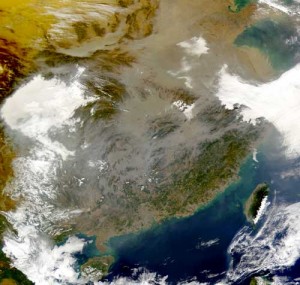 Climate change is a very serious international problem that is likely to influence human development for centuries to come. Despite warnings of environmental crisis, the production of CO2 is not being abated but is in fact increasing as developing countries such as China and India continue to excrete immense quantities of pollution in an effort to buildup their economies as quickly as possible. Even more disconcerting is the fact that China, India, and African states will not be willing to disrupt that growth. They will point out that the Western countries engaged in the same pollution production during the 19th and 20th century. Any pollution curbing initiatives are to be viewed as impositions from post-materialist Western countries who have “been there & done that” and want to close the door of progress behind them.
Climate change is a very serious international problem that is likely to influence human development for centuries to come. Despite warnings of environmental crisis, the production of CO2 is not being abated but is in fact increasing as developing countries such as China and India continue to excrete immense quantities of pollution in an effort to buildup their economies as quickly as possible. Even more disconcerting is the fact that China, India, and African states will not be willing to disrupt that growth. They will point out that the Western countries engaged in the same pollution production during the 19th and 20th century. Any pollution curbing initiatives are to be viewed as impositions from post-materialist Western countries who have “been there & done that” and want to close the door of progress behind them.
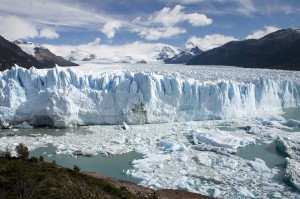 Meanwhile, where there is a seed of doubt…short-term revenue generation supersedes intangible future consequences. As a result, the Western powers continue to rely on natural resources as a primary source of energy production. Resource wealth generates revenue! Although these countries have the best knowledge, science, and technology, and are able to determine that climate change is a real phenomenon, politicians and CEOs continue to use the plausible spectrum of excuses for inaction from doubting the causal relationship between CO2 emission and climate to pointing out that the developing world is polluting anyway. Through these justifications, Western leadership in the public and private sector continue to leave international agreements such as the Kyoto protocol behind without much consequence. In addition, even if politicians come to their senses, the task of converting to a more green technology economy requires a political will that is not present in the general public who have materialist needs in the short-term. The logistical changes required will take many years to organise, and are currently on a gradual path. More significantly, green technology would also cause a reduction in demand for oil which is antithetical to the interests of specialists in the energy sector today. There are too many other problems in the world that appear more pressing, and immediate. 3 years ago, the environment was a top concern in Canada, today, it is not a priority. The economy is a priority. The environments causal relationship with the economy is secondary to revenue streams, and job creation in most people’s minds. Further oil exploration would drop the price of fuel stimulating the economy, so as far as voters are concerned, taking the environment issue seriously means obstructing economic growth, and taking a short-term hit.
Meanwhile, where there is a seed of doubt…short-term revenue generation supersedes intangible future consequences. As a result, the Western powers continue to rely on natural resources as a primary source of energy production. Resource wealth generates revenue! Although these countries have the best knowledge, science, and technology, and are able to determine that climate change is a real phenomenon, politicians and CEOs continue to use the plausible spectrum of excuses for inaction from doubting the causal relationship between CO2 emission and climate to pointing out that the developing world is polluting anyway. Through these justifications, Western leadership in the public and private sector continue to leave international agreements such as the Kyoto protocol behind without much consequence. In addition, even if politicians come to their senses, the task of converting to a more green technology economy requires a political will that is not present in the general public who have materialist needs in the short-term. The logistical changes required will take many years to organise, and are currently on a gradual path. More significantly, green technology would also cause a reduction in demand for oil which is antithetical to the interests of specialists in the energy sector today. There are too many other problems in the world that appear more pressing, and immediate. 3 years ago, the environment was a top concern in Canada, today, it is not a priority. The economy is a priority. The environments causal relationship with the economy is secondary to revenue streams, and job creation in most people’s minds. Further oil exploration would drop the price of fuel stimulating the economy, so as far as voters are concerned, taking the environment issue seriously means obstructing economic growth, and taking a short-term hit.
 When Abraham Lincoln wanted to curb slavery, he was battling the entrenched interests of the Southern US states. Slavery was a moral wrong, but slavery was also central to the Southern US economy. Only a violent, and brutal war (about the terms of American’s state rights not slavery itself) could force the Southern states to abolish slavery. Today, pollution might be seen in a similar vein. It could be argued (tenuously) that an aggressive policy of anti-oil production would trigger war over government intervention in industry or western government intervention against developing powers. Unlike slavery however, environmentalism is an abstract, post-materialist issue for 95% of the human population. It is not like slavery in most ways, but the way politicians have to address it is rather similar. If climate change is evaded there will be many historians, and politicians who argue that climate change was never a serious threat but a government led conspiracy in the first place. Business led solutions are the way forward but they are slow to act.*
When Abraham Lincoln wanted to curb slavery, he was battling the entrenched interests of the Southern US states. Slavery was a moral wrong, but slavery was also central to the Southern US economy. Only a violent, and brutal war (about the terms of American’s state rights not slavery itself) could force the Southern states to abolish slavery. Today, pollution might be seen in a similar vein. It could be argued (tenuously) that an aggressive policy of anti-oil production would trigger war over government intervention in industry or western government intervention against developing powers. Unlike slavery however, environmentalism is an abstract, post-materialist issue for 95% of the human population. It is not like slavery in most ways, but the way politicians have to address it is rather similar. If climate change is evaded there will be many historians, and politicians who argue that climate change was never a serious threat but a government led conspiracy in the first place. Business led solutions are the way forward but they are slow to act.*
 Too much obsessing about climate change is exhausting, especially since it is a post-materialist issue when compared to paying for next month’s rent and other more immediate concerns like mass starvation. At the macro-level, climate change suffers from a collective action problem that overshadows any viable solution. Responsibility for the environment can be passed from state and provincial to federal and central governments, from baby-boomers to their grandchildren, and from developed to developing world. A plausible means through which climate change may be more seriously addressed is if green technology could be proven to be highly profitable, and cost-effective. Shooting CO2 into the ground might solve the problem, but unless governments make emitting CO2 into the atmosphere illegal (which they would have difficulty enforcing), such a solution is irrelevant. If green technology undercuts the oil industry, production will move in that direction.
Too much obsessing about climate change is exhausting, especially since it is a post-materialist issue when compared to paying for next month’s rent and other more immediate concerns like mass starvation. At the macro-level, climate change suffers from a collective action problem that overshadows any viable solution. Responsibility for the environment can be passed from state and provincial to federal and central governments, from baby-boomers to their grandchildren, and from developed to developing world. A plausible means through which climate change may be more seriously addressed is if green technology could be proven to be highly profitable, and cost-effective. Shooting CO2 into the ground might solve the problem, but unless governments make emitting CO2 into the atmosphere illegal (which they would have difficulty enforcing), such a solution is irrelevant. If green technology undercuts the oil industry, production will move in that direction.
Ultimately it might be too 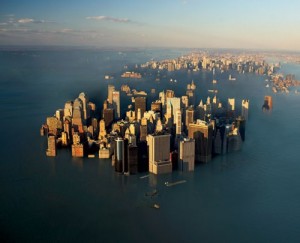 late, so the best motivating force for action on climate change will likely be flooded coastal cities, and millions of displaced people turned refugees. Even at that point, it is unlikely that CO2 will be curbed too significantly since those refugees might only be a tiny minority of the total pollutions, and once the damage is done to the world economy, it cannot be reversed. Even if the devastation is uniform around the world, tough action might still be difficult to enforce since cheap oil production will always tempt black market entrepreneurs to increase production with major revenue gains to be had. Only if devastation moves further inland will real legal action take place. Yet what cripples action most is the sense of inevitability: this phenomenon explains the chain-smoking cancer patients that continue smoking to the very end.
late, so the best motivating force for action on climate change will likely be flooded coastal cities, and millions of displaced people turned refugees. Even at that point, it is unlikely that CO2 will be curbed too significantly since those refugees might only be a tiny minority of the total pollutions, and once the damage is done to the world economy, it cannot be reversed. Even if the devastation is uniform around the world, tough action might still be difficult to enforce since cheap oil production will always tempt black market entrepreneurs to increase production with major revenue gains to be had. Only if devastation moves further inland will real legal action take place. Yet what cripples action most is the sense of inevitability: this phenomenon explains the chain-smoking cancer patients that continue smoking to the very end.
 The Following Is A Thought Experiment: Since climate change will likely not be stopped through conventional approaches, a radical thought experiment might as well investigate a rather absurd medium to long-term solution. Human exploration of the Moon and Mars has developed from some initial landings, and robot probing, but perhaps herein lies a solution that is mutually beneficial to 1) the climate change conundrum, and 2) the goal of colonizing other planets for the continuation of the human species. This idea is at least worth considering as a thought experiment….Traditionally colonisation has been supported as a means of acquiring natural resources, and exploiting rare material resources, but for this argument, colonisation has other benefits. The GDP of the Moon in 2050 could be 0 dollars or Trillions of USD. It is up to us to think more long-term about the Moon to begin to think boldly about solutions that, although seem implausible, are not beyond the ingenuity of our species. The World Economy stands to gain from developing interplanetary trade. Opening up new markets is essential for capitalism to continue to expand. The short-term costs may very-well outweigh the benefits, but it is more likely that the inverse is true.
The Following Is A Thought Experiment: Since climate change will likely not be stopped through conventional approaches, a radical thought experiment might as well investigate a rather absurd medium to long-term solution. Human exploration of the Moon and Mars has developed from some initial landings, and robot probing, but perhaps herein lies a solution that is mutually beneficial to 1) the climate change conundrum, and 2) the goal of colonizing other planets for the continuation of the human species. This idea is at least worth considering as a thought experiment….Traditionally colonisation has been supported as a means of acquiring natural resources, and exploiting rare material resources, but for this argument, colonisation has other benefits. The GDP of the Moon in 2050 could be 0 dollars or Trillions of USD. It is up to us to think more long-term about the Moon to begin to think boldly about solutions that, although seem implausible, are not beyond the ingenuity of our species. The World Economy stands to gain from developing interplanetary trade. Opening up new markets is essential for capitalism to continue to expand. The short-term costs may very-well outweigh the benefits, but it is more likely that the inverse is true.
Telecommuting will be the initial phase of Martian economic development. People working on Earth will be running the mining equipment on Mars with few people actually on Mars to manage this development. But that is the initial stage….
There is a little city in England called York. There is a huge city in America called New York. One day, there will be a city on the Moon. We have to decide what that city might be called, and which colonial power will reap the benefits of its establishment.
What if over 50% of CO2 production was shifted from Earth to the Moon, and Mars?
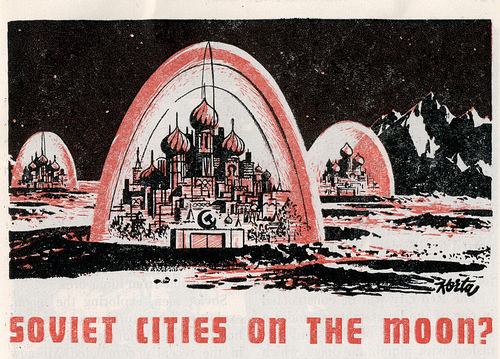 If the production of CO2 gas could be controlled by moving industry, and sources of pollution to another planet, then the climate change issue would be a more solvable problem. Of course, much of the CO2 production is caused by food production so that industry would likely remain on Earth but bulk manufacturing could be moved, and shifted to the Moon first, and eventually to Mars in order to ensure that these planets have a massive increase in CO2, this will be necessary for the terra-forming process. You think this is insane, because you only care about the short-term. Yet, everyone knows that short-term thinking is the problem.
If the production of CO2 gas could be controlled by moving industry, and sources of pollution to another planet, then the climate change issue would be a more solvable problem. Of course, much of the CO2 production is caused by food production so that industry would likely remain on Earth but bulk manufacturing could be moved, and shifted to the Moon first, and eventually to Mars in order to ensure that these planets have a massive increase in CO2, this will be necessary for the terra-forming process. You think this is insane, because you only care about the short-term. Yet, everyone knows that short-term thinking is the problem.
 How would such a feat be accomplished? World leaders would have to raise an international colonisation fund, and countries would have to agree to work together on this mutually beneficial project. Again, this falls into the cracks of collective action, but if the US or China were to spearhead this program, others would want to be beneficiaries of Martian and Lunar colonisation as well.
How would such a feat be accomplished? World leaders would have to raise an international colonisation fund, and countries would have to agree to work together on this mutually beneficial project. Again, this falls into the cracks of collective action, but if the US or China were to spearhead this program, others would want to be beneficiaries of Martian and Lunar colonisation as well.

For this project to work, there would be major frontloaded short-term costs that would need to be justified by the sustainability of this approach to fighting climate change. Those major costs include:
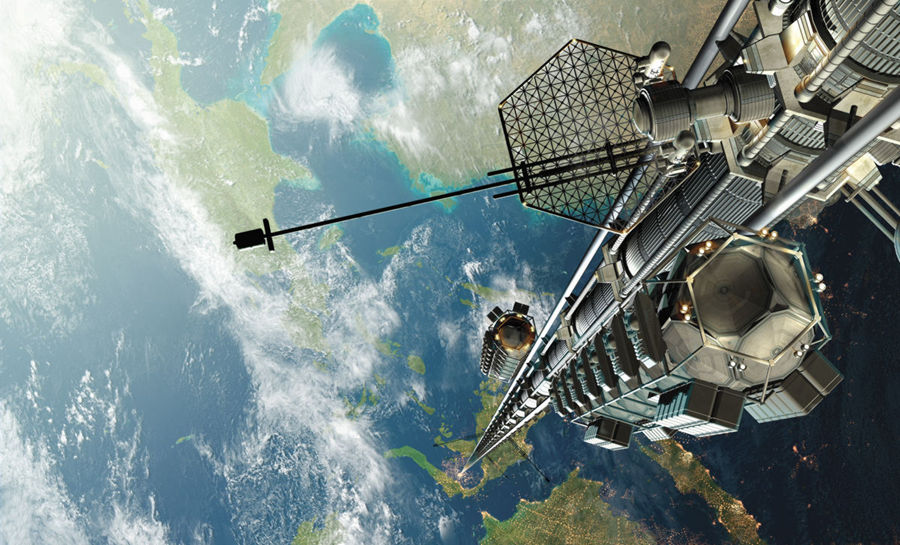
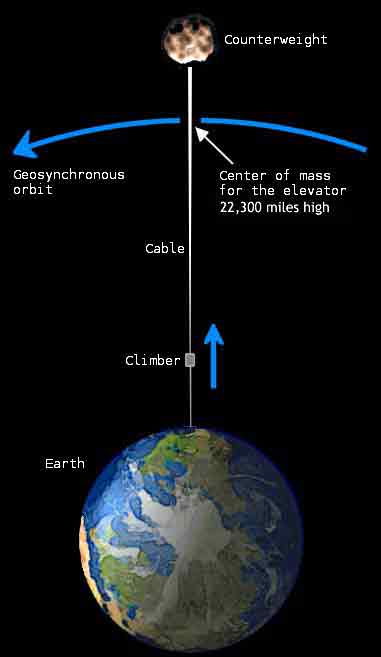 Efficient & Cost Effective Space Transport: the major cost is transport from Earth to Space. Efforts to launch single-use rockets into space are inefficient, and costly. The alternatives are high flying aircraft which are also costly per use. The most compelling way forward is through the use of a skyhook. Attached to the ground, a long cable would reach up into the sky with a space station tethered into high orbit. The cable would have to exceptionally light weight, as well as durable so that its weight could be supported as it was being constructed, and used. The space station would hold this elevator in place so that large amounts of material could travel up and down these skyhooks at a much lower cost than any conventional means that has thus far been developed. Transport for the Moon and Mars would be relatively easy. The Moon would be an obvious priority due to distance, but Mars has a much more similar gravitational pull to our own and would be more suited for permanent colonisation. On Mars and the Moon, skyhooks would also be constructed to ensure cost-effective travel down these gravity wells.
Efficient & Cost Effective Space Transport: the major cost is transport from Earth to Space. Efforts to launch single-use rockets into space are inefficient, and costly. The alternatives are high flying aircraft which are also costly per use. The most compelling way forward is through the use of a skyhook. Attached to the ground, a long cable would reach up into the sky with a space station tethered into high orbit. The cable would have to exceptionally light weight, as well as durable so that its weight could be supported as it was being constructed, and used. The space station would hold this elevator in place so that large amounts of material could travel up and down these skyhooks at a much lower cost than any conventional means that has thus far been developed. Transport for the Moon and Mars would be relatively easy. The Moon would be an obvious priority due to distance, but Mars has a much more similar gravitational pull to our own and would be more suited for permanent colonisation. On Mars and the Moon, skyhooks would also be constructed to ensure cost-effective travel down these gravity wells.

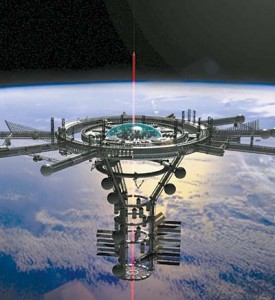 CO2 Factories on the Moon & Mars: Once in orbit, space crafts would then travel to the Moon and Mars where they would find established colonies under construction to house the families of Earthlings seeking a better and more financially sustainable life (although it isn’t clear that this would be attractive enough on its own). Factories would mine the resources available on Mars which would then be used to fuel the production of goods. Energy itself would be the most valuable commodity, so that electricity could be generated and then transported through space using advanced electricity transference technology. This would entail shooting electricity through space, and then trapping it on Earth.
CO2 Factories on the Moon & Mars: Once in orbit, space crafts would then travel to the Moon and Mars where they would find established colonies under construction to house the families of Earthlings seeking a better and more financially sustainable life (although it isn’t clear that this would be attractive enough on its own). Factories would mine the resources available on Mars which would then be used to fuel the production of goods. Energy itself would be the most valuable commodity, so that electricity could be generated and then transported through space using advanced electricity transference technology. This would entail shooting electricity through space, and then trapping it on Earth.
 Life On Mars: A Martian solar day is 24.35 hours, so sleep patterns would be similar. An entire culture would be created through the experience of living on Mars. Over time, an entire race of humans would emerge, unless transportation to and from Mars were maintained regularly. Certainly, workers would commute to and from the Moon on a regular basis, but Mars would involve more long-term commitments. At the outset, the construction of infrastructure on Mars would be immensely more expensive in the short run, and even the most debt flexible governments would be unlikely to follow through on such a plan, unless they could see the light at the end of the tunnel early on. The GDP of the Moon and Mars would help to generate wealth that could be transferred back to the countries, and companies on Earth that lead this development.
Life On Mars: A Martian solar day is 24.35 hours, so sleep patterns would be similar. An entire culture would be created through the experience of living on Mars. Over time, an entire race of humans would emerge, unless transportation to and from Mars were maintained regularly. Certainly, workers would commute to and from the Moon on a regular basis, but Mars would involve more long-term commitments. At the outset, the construction of infrastructure on Mars would be immensely more expensive in the short run, and even the most debt flexible governments would be unlikely to follow through on such a plan, unless they could see the light at the end of the tunnel early on. The GDP of the Moon and Mars would help to generate wealth that could be transferred back to the countries, and companies on Earth that lead this development.
 In the history of Empires, the benefits of managing sub-ordinate states, and acquiring their wealth at cheap prices has been very beneficial for those colonial powers. Continuing this trend will make the colonisers very wealthy. The problem is that after a few generations the colonized might realise that they are getting screwed over.
In the history of Empires, the benefits of managing sub-ordinate states, and acquiring their wealth at cheap prices has been very beneficial for those colonial powers. Continuing this trend will make the colonisers very wealthy. The problem is that after a few generations the colonized might realise that they are getting screwed over. 
A multi-cultural society would need to emerge on Mars, and government decisions would be largely shaped on demographics, thus controlling the development of Martian urban centres would rely on controlling who was migrating to and from Mars.
 The Core Benefit Is There: The core benefit being the off-setting of CO2 production on Earth, and the colonisation of the Moon and Mars as alternative planets to live on should the Earth no longer be suitable. Terraforming would commence. The production of CO2 on Mars would be advantageous for colonisation as it would change the climate there, thus making it more suitable for a green-lush, Earth-like environment over time. There are all kinds of unforeseen benefits of Martian colonization from the cure for cancer to the invention of new athletics sports on the Martian gravity. This new society would emerge as a product of human development in the same way that the Americas became a major technological, and political endeavor. The key is that action needs to begin now. If possible, Mar colonisation should begin within this century or the next.
The Core Benefit Is There: The core benefit being the off-setting of CO2 production on Earth, and the colonisation of the Moon and Mars as alternative planets to live on should the Earth no longer be suitable. Terraforming would commence. The production of CO2 on Mars would be advantageous for colonisation as it would change the climate there, thus making it more suitable for a green-lush, Earth-like environment over time. There are all kinds of unforeseen benefits of Martian colonization from the cure for cancer to the invention of new athletics sports on the Martian gravity. This new society would emerge as a product of human development in the same way that the Americas became a major technological, and political endeavor. The key is that action needs to begin now. If possible, Mar colonisation should begin within this century or the next.
The following is a précis of:
The ASSAULT ON REASON
AL GORE

Introduction
Al Gore’s introduction is designed to layout his central arguments and the ultimate solutions to an alarming crisis of reason that is emerging in the United States of America. Gore begins by noting that the representative democracy intended by the Founders is in a state of crisis where rational thought is being usurped by the way ideas are communicated. The media is obsessed with the triviality of Paris Hilton or O.J. Simpson motivated by sensationalism that leads to record profits for television conglomerates. Gore argues that cycle of image over substance began with the Simpson trial and has not been abated but rather has advanced – during the Bush administration – to new heights of mass manipulation. America rushed into the Iraq war because of the subservient willingness of media to co-modify ideas in an irrational and fear driven manner. Basically, substance is constantly being defeated by image in American political culture. Television is watched, on average, 4.5 hours per day by the American public. Reading is on a massive decline and political engagement occurs through visual representations in the television medium. Senator’s are too busy planning a 30 second campaign spot over actually discussing policy in a constructive forum…um…like the Senate. Meanwhile politicians are disproportionably from the most affluent class in America society leaving meritocracy in jeopardy against elite patronage. Gore turns to the emergence of the Age of Reason which begat the Founder’s intended democracy. Gutenberg’s 1450 invention of the printing press allowed a vast expansion in human knowledge. Literacy was once the foundation for democratic discourse in the marketplace of ideas. Today, Jurgen Habermas argues that the marketplace of ideas (public forum) is narrowing in scope; the electorate can no longer discern the difference between Democrat and Republican despite glaring ideological differences, according to Gore. The root of this emerging democratic crisis is, most centrally, the change in communication that has led to a feudalistic media sharing society. The media is sensationalist: “if it bleeds, it leads”. The line between entertainment and news is being skewed in American culture: citing Jon Stewart. Gore explains the philosophical underpinnings of his solution by explaining Marshall McLuhan’s thinking on media. McLuhan recognized that the medium is the message: the form of communication such as television/reading is more important than the content. McLuhan recognized that reading is an intensely cognitive process while television is counter-intellectual and stimulates the emotion centres of the brain excessively. Al Gore wants to return to a reasoned approach to democracy, which means that the citizens brain patterns themselves should to be reorganized in order for America to return to the democracy the Founders intended.

Chapter One: The Politics of Fear
The opening line of this chapter is also its central argument: fear is “the most powerful enemy of reason.” At equilibrium, fear and reason are both instrumental in survival. When fear dominates reason, however, irrational hatred and division lead to de-stabilization of the democratic institutions and there is a collapse of meaningful dialogue. The exploitation of fear is demagoguery while leadership harnesses some fear for constructive political change. Suppression and fear-mongering should be alien to the American way of life. He mentions that the assault through fear is destructive: McCathyism and the fact that the conflation of 9/11 and Hussein is still widely believed by over 50% of the American public. Bush’s yellow cake evidence has been revealed as forged. Clearly, when the ‘immune system’ of nation does not exploit these massive errors there is something deeply wrong. So what is happening to the human mind? Gore examines the human brain itself to suggest that emotional fear is processed in a unique manner that influences action. Post-Traumatic Stress Disorder (PTSD) is organized differently than other memories. PTSD memory is not organized in a time sequence but rather can emerge at any given moment to re-assert itself. The reasonable weighing of policy and action can be overwhelmed by these PTSD memories that are emotionally process in the amygdala. Even the historical memory of the Turkish invasion of Greece from 800 years ago still has staying power. Gore wonders how we reconcile these grievances in a democratic manner. Those who watched television on 9/11 were emotional scarred in the same level as someone who was in New York at the time. Television is able to invoke PTSD and orienting response . Television drives our brain receptors that are being excessively activated, thus triggering a susceptible to hypnotic fear. Professor Barry Glassner notices that fear-mongering requires repetition, irregularity and misdirecting. The horrifying picture of Abu Ghraib prisons, Vietnam and Iraq have fuelled the visual responses. 9/11 led the imagination to visualize other conceivably devastating events. Fear can be both legitimate or imagined fear but both are equally powerful forces. Invading Iraq was both tragic and absurd. Gore admits he trusted Bush like everyone else. Iraq was a new product for the 2002 midterms after Bin Laden was no longer a viable target. Curiously, DeLay abused the new Department of Homeland Security to track Democratic legislators and bring them to Congress for important votes . The politicization of the Iraq war, for partisan support, gives the Republican Party the national governing status that has marginalized Democrats. Bush and Nixon both disregarded their party policies to advance their re-election. Nixon explained that “people react to fear, not love. They don’t teach that in Sunday school, but it’s true.” A fearful society is what has emerged and it is jeopardizing America’s democratic foundation.

Chapter Three: The Politics of Wealth
Democracy and capitalism share an internal logic: they are part of a double helix that forms the structure of freedom, according Gore. Capitalism is however about competition while democracy is about equality. The Founders worried about the concentration of wealth as a threat to the harmony of these two principles. The forum of democracy is not open when the gatekeepers are affluent and dominate the marketplace of ideas. The meritocracy, where ideas can come from anywhere, is being blocked and the rule of reason is being manipulated. Gore sees the 30-second candidate commercial as the epitome of this manipulation. Votes are being purchased and the true interest of voters is being ignored or otherwise manufactured. Private foxes have been placed to guard the henhouses of American; that is – for example – the oil industry control climate change discussions. Corporations are outsourcing the truth. Corporate wealth has silenced the two-way conversation of democratic discourse. Halliburton undermined U.S. policy in Iraq, in fact, that policy prescription was in motion prior to 9/11. The Founders did not want this to happen; they even believed that those without property should not be allowed to vote because they would likely be influenced by the political leanings of rich property owners. Capitalism defended slavery, like it defended Bush’s Iraq policy. Lincoln feared capitalisms growing strength during the Civil war. Corporation have personal status as of Santa Clara County v. Southern Pacific Railroad 1886. Upton Sinclair and other ‘muckrakers’ were able to awaken the American consciousness when it was being threatened by vested interests. Radio was introduced in Nazi Germany and Fascist Italy as a propaganda tool before it become accountable. Bernays was a propaganda genius and the father of public relations who turned women on to cigarettes by dubbing the ‘torches of freedom’. Advertising manufactures consent as Lippman and Chomsky noted. Each new media technology (cable, satellite and internet) requires an awakening from the corporate deceit engrained in the capitalist section of the double helix called freedom, however, today the awakening seems an insurmountable tasks. Greed and wealth now allocate power in America at the expense of democracy.
Chapter Five: The Assault on the Individual
Gore argues that the information revolution has had vast political implications. The individual has the potential to leverage massive political power. Illiteracy has emerged because of the dominance of television over the printing press and the continued infancy of the Internet. Blogs are an emerging check on mass media. The assault on individuals however is manifested in policies where the president can seize and imprison any citizen and suspend habeas corpus by using the label ‘unlawful enemy combatant’. This is Kafka-esq. Bush has circumvented the Supreme Court on numerous occasions. The Patriot Act allows for a ‘sneak and peak’ approach where citizens’ privacy can be invaded at the whim of Washington without a warrant. Internet, emails, phone the Bush Administration is monitoring calls and this could be used to win re-election or blackmail Democrats but no one can stop them, it appears. The FBI attends church meetings, rallies, political meetings and looks at bank records, credit cards etc. This is an absurd contravene the American constitution. Al Gore claims that 9/11 could have been prevented if the Bush Administration had been smarter. Gore lists a series of warning signs that showed Bin Laden had nefarious intentions. Gore does not believe Bush intentionally ignored that data to heighten the chances of attack but Gore does fear a Big Brother-style America. He adds that the surveillance information they gather for all American citizens is mostly superfluous and most of it should be cut out . The technology of surveillance is tantamount to a police state while corporations could be sold this data and are engaged in enhancing sales themselves. Some people believe that the concentration of power in the executive was what the constitution calls for but this not true. Immediately after 9/11 Arab immigrants were rounded up and sent to Guantanamo, this is similar to Japanese internment in the 1940s. Like the innocent arrests on American soil, elite decision-makers who did not emphasize legal rights for detainees caused the Abu Ghraib debacle. They then downloaded responsibility to the ‘bad apples’ involved in the scandal. Abu Ghraib was a former torture prison under Hussein; the only difference is the torturers. McCain’s anti-torture amendment was passed but Bush stated the president is not bound by the legislation. Gonzales has publicly stated that Geneva is ‘too quaint’ while Ingraham has argued that Americans love the show 24 because of the tough tactics and therefore they approve of the Bush Administrations strategy in Iraq. Gore thinks the Neilsen ratings should not be used to interpret public opinion. The dehumanization of Iraqi civilians is the first step towards the destruction of the soul of American soldiers. Anyone who questions these policies is unpatriotic and the drive to consolidate power in the name of national security is an old story. Some one has to change last page.

Chapter Six: National Insecurity
This chapter is dedicated to an attack on the Bush Administration’s foreign policy. America should be respected in the world but Bush has served to make America a growing target of international disgust. Unilateralism results in the suffering of an entire country. Gore believes that we should cause the change we wish to see in the world: there are other threats beyond terrorism. These threats include global warming, the water crisis, defeating drugs, corruption and HIV/AIDS. AIDS may kill more people in sub-Saharan Africa in the first decade of the 21st century than the entire war related death of the 20th century . These problems can be overcome much like slavery during the Civil war, hopefully without the bloodshed. Why has America gone astray? In every policy area, Bush-Cheney has been trying to reduce constraints. The United States has traded in respect for fear during the Iraq war. The pre-emptive doctrine of military engaging sovereign states that were not an imminent threat has totally discredited America’s foreign policy and destroyed international laws conventions. Why has the Bush administration abandoned Afghanistan, Gore believes we should finish the job there. The Comprehensive Test Ban Treaty has also been ignored so that the military industrial complex can build smaller bunker busting nuclear weapons. Bush is only enhancing the likelihood that other nations will desire nuclear weapons. More states will join the nuclear club on account of Bush’s misstep on the CTBT. The weaponization of space is another debacle that rejects the Outer Space Treaty, which states that every nation deserves to travel in the Earth’s upper atmosphere. Bush rejects the International Criminal Court because Americans have violated the Geneva Convention. Bush has turned a $5 trillion dollar surplus into a projected cumulative deficit of $4 trillion. Guantanamo has also harmed our prestige abroad: how can we criticize China’s human rights records now? Bush deserves the benefit of the doubt on preventing 9/11 but the CIA briefings: “Bin Laden determined to strike in U.S.” showed that the alarms were ringing while no one cared. We should prevent catastrophe from other crises like climate change, in advance. Terrorism has been on the rise since 9/11. Bush’s failed policy in Afghanistan and Iraq has made the world a more dangerous place. Those who attacked these policies were sidelined or publicly humiliated. Gore believes that Bush senior should have deposed Hussein in 1991 but missed the chance. America had little foreign support and the UN was not supportive of the 2003 invasions, it discredited the entire international community. The enlightened vision of the UN, NATO as international organizations needs to be restored. America’s moral authority in the world needs to be resurrected or risk damage that is incalculable.